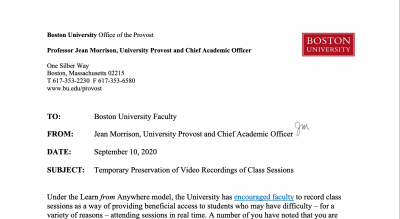All class video recordings from the Spring, Summer and Fall semesters will be temporarily stored by Boston University, Provost Jean Morrison wrote in an email Thursday to all faculty.

BU Information Services and Technology has been asked to temporarily disable the delete function within the Zoom cloud, Morrison wrote.
The provost’s decision was prompted by five class action lawsuits the University is facing, which the email states “challenge the quality of the education and overall student experience” after the transition to online learning in March.
The University Office of the General Counsel advised Morrison to have the University, as a defendant, preserve any evidence that could prove relevant to the lawsuits, the email states. The attorneys determined that curricular materials, including class recordings, may be relevant.
Because recordings are often stored on BU-controlled platforms such as Blackboard, the University “has a legal duty to preserve them,” Morrison wrote. The advice does not apply to non-curricular materials, such as interviews, research and meetings.
BU spokesperson Colin Riley said the attorneys’ guidance means to enable a broad record preservation, and that the files would only be used if relevant to the argument.
“You want to retain and preserve things when you have a possibility that you may end up being asked for it in a legal setting,” Riley said. “[Recordings are] what’s taking place during class instruction, and they’re being retained for the sole purpose of being able to provide them, if necessary.”
It is unclear at this time whether these materials will be required, Morrison wrote, but upon potential use, student and faculty privacy will be sought “to the fullest extent allowed by the court.”
Morrison wrote to faculty who may be hesitant to record their class sessions that BU is retaining these recordings solely for potential necessary use in these lawsuits.
Faculty will be notified of the materials that will be used, she wrote, and the materials can be deleted when the litigation is over.
“The University’s need to temporarily preserve these recordings in no way affects faculty’s intellectual property rights with respect to their teaching materials,” Morrison wrote.
Journalism professor Chris Daly wrote in an email that he questions students’ guaranteed privacy under the Massachusetts two-party consent law.
“In every class, I read a ‘mandatory’ statement from the administration notifying students that they are being recorded,” Daly wrote. “I promise them that no one except their classmates in the same course will ever see it. Now, if it becomes evidence in a trial, won’t it be seen by all the attorneys and possibly, by a jury as well?”
Health Sciences instructor Kaytlin Eldred emailed her students Friday regarding the Provost’s announcement, informing them of an addition to the course syllabus, which was taken from BU’s Digital Learning and Innovation web page for classroom recordings last updated Aug. 30.
“Class recordings in which students are present and identifiable are subject to certain legal rules, under the Family Educational Rights and Privacy Act,” the statement reads, “with which instructors must comply.”
To accommodate asynchronous students and those with Internet connection issues, her class session will be recorded. The updated syllabus states that the recording may be turned off at times to preserve student privacy and “eliminate the possibility that recording sensitive information might stifle discussion.”
Students are also able to opt out of recordings “without their classroom experience being diminished” by either sitting outside of the camera’s view in the classroom or using an alternative Zoom name and turning their video off.
A junior in the Questrom School of Business who asked to remain anonymous is enrolled in a course that has not permitted class recordings for privacy reasons since the beginning of the semester.
“You may not record or screenshot any part of the class discussion without prior permission,” the course syllabus states. “This class requires synchronous attendance in person or remote. To protect the safety and privacy of our students, we will NOT record our meetings.”
The student said the professor decided not to record because it is uncertain what recordings could be used for in the future. However, the student said he feels it would be helpful to have recordings available for reference.
He said he believes showing these files as evidence could instead disprove BU’s quality of education when the video or audio are unclear.
“If you’re going to be spending $70,000 on an education it should be very good quality, very good audio,” the student said. “I’m paying for online school. I should get good quality online school.”
He added that poor audio can disrupt the learning process and that virtual learners may find it difficult to hear the in-person students talking from within the classroom.
“If the quality of the video isn’t good, then it’s much harder to learn and it actually takes away from the learning of students,” the student said. “They have to focus on if it’s clear enough, if you have to go back and relisten to something because the audio was not the best.”
UPDATE: This article has been updated to include the fact that the portion added to Eldred’s course syllabus Friday was taken directly from an Aug. 30 notice on BU’s Digital Learning and Innovation website.
























































































































